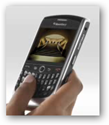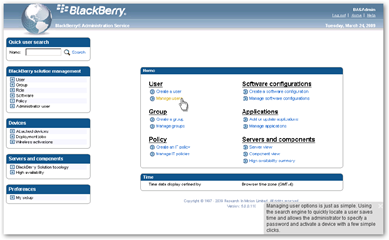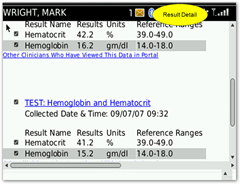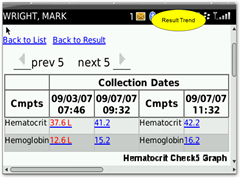Recently I had the opportunity to talk with Fraser Edward from Research In Motion (RIM), the maker of BlackBerry smartphones to discuss the impact and products offered from BlackBerry for the Healthcare Industry.  Beginning with a little history on BlackBerry, the company gained it’s real market with the innovation of getting email to their clients in real time, pushing email. Myself, I can remember a while back too when the BlackBerry devices pretty much had the market cornered as it was able to push email to clients immediately, before anyone else in the mobile market offered this type of service.
Beginning with a little history on BlackBerry, the company gained it’s real market with the innovation of getting email to their clients in real time, pushing email. Myself, I can remember a while back too when the BlackBerry devices pretty much had the market cornered as it was able to push email to clients immediately, before anyone else in the mobile market offered this type of service.
In the discussion below, we chatted a bit more specifically on where BlackBerry smartphones are today and where the future lies and where they are currently making an impact in healthcare.
Before arriving at BlackBerry, Fraser had actually spent a number of years with the wireless industry in the United Kingdom, then moved on to the US  and has had 7 years specifically devoted to the healthcare vertical.
and has had 7 years specifically devoted to the healthcare vertical.
We talked initially about doctors using the mobile devices and Fraser was first to admit that doctors didn’t care about email, the one item mentioned above as the big feature that brought BlackBerry to the market place, they want pagers as that is what they have been using for years, simple and one buzz and they make a phone call after reading a text message, and some only like a phone number reference. Here was the challenge, how do we move up to the next level with a device that has an entire operating system and still offer a paging type of service that has the same or similar familiarity.
The obvious answer was to incorporate some of the familiar paging features, but at the same time introduce some additional productive applications that could move their communications up to the next level, in other words add some value. One of the first items BlackBerry introduced to handle the job was the BlackBerry Enterprise Server, in other words allow the devices to communicate in a much smarter fashion with enterprise solution software. The BlackBerry Enterprise Server is a specific application to group and house members of an organization with application software specific to their use and needs.
Fraser stated that again, the doctors were really not even aware of the fact that much of their work could be conducted in a mobile fashion instead  of having to always find a mobile PC at the hospital to read or enter data. Sometimes finding an open and available PC could take additional time as well, so having the availability of a hand held unit could certainly be useful with saving time. By using the BlackBerry Enterprise Server configuration, new applications are pushed to the device for updates, etc.
of having to always find a mobile PC at the hospital to read or enter data. Sometimes finding an open and available PC could take additional time as well, so having the availability of a hand held unit could certainly be useful with saving time. By using the BlackBerry Enterprise Server configuration, new applications are pushed to the device for updates, etc.
The first move is to address eliminating the pagers. BlackBerry smartphones can work with a number of enterprise solutions to allow physicians to collaborate. Microsoft Exchange as well as Lotus Notes are 2 corporate email system that work with the BlackBerry Enterprise Server. Fraser stated that using BlackBerry Mobile Voice Systems allow the doctors to hide the personal phone number for the device and show the hospital phone number for caller ID purposes. This is somewhat of project here to educate and convince the physicians that the device can offer more functionality and yet still provide the same basic paging type of service that has been utilized for years. One example is Page Sync, which allows the device to function and even have the exact same sounds as a pager would sound, with the displayed message appearing on the screen. What is also interesting and probably very desirable is the ability to have dual capabilities here, in other words the ability to keep business and personal alerts separate but yet only have to carry one device so the physician is able to keep up with both sides of life and not mix the 2.
“When you have a BlackBerry and want to retain existing pager numbers, USA Mobility’s PageSync service lets your users carry one device, but enjoy the functionality of two.PageSync makes your BlackBerry device work like two units in one with paging, data, and e-mail service on a single, compact device. Retain the familiar experience of paging and send messages the same way you send pages today.”
Clinic Uses BlackBerry As Pager and Consolidates Devices
BlackBerry smartphones are still the number one smartphone for businesses, and this includes healthcare, Fraser mentioned, and has working interfaces with McKesson and Siemens for example, 2 very large players in Healthcare IT. A couple screenshots are shown below using a McKesson program on a BlackBerry smartphone.
The number of physicians using mobile devices, according to the Manhattan Research Association is growing by leaps and bounds this last year and the #1 smartphone among physicians is the BlackBerry according to their information and studies. The research association also happens to provide a page on Facebook with additional information you can find here.
 One other program that many are already familiar with is Epocrates, which allows an easy listing of all the current formularies and drug availabilities, both generic and name brand, and myself, I have used the “free” look up version for years on my own mobile unit. As a consumer, I use it to quickly find the $4.00 generic drugs for a prescription, to see if one is available for a name brand for example, those are loaded now too from Epocrates and I also provide a look up on the blog with Epocrates too in the resource columns.
One other program that many are already familiar with is Epocrates, which allows an easy listing of all the current formularies and drug availabilities, both generic and name brand, and myself, I have used the “free” look up version for years on my own mobile unit. As a consumer, I use it to quickly find the $4.00 generic drugs for a prescription, to see if one is available for a name brand for example, those are loaded now too from Epocrates and I also provide a look up on the blog with Epocrates too in the resource columns.  The software is available for use on a BlackBerry smartphone.
The software is available for use on a BlackBerry smartphone.
I asked Fraser, what about security, we hear this big question all the time, is a BlackBerry a secure device?
Yes, he stated and encryption is built in with the BlackBerry Enterprise Server as well and passwords can be made mandatory, so in other words you are not going to have access without a password as HIPAA compliance of course is a must today, and even stronger methodologies than HIPAA are deployed as well. In a hospital environment he stated, there are many security options through the BlackBerry Enterprise Server that can be configured. Recently there have been reports on the news with staff taking pictures with mobile devices, and with BlackBerry custom configurations, this can be disabled if desired for a simple example for perhaps not allowing camera access for some or all staff members.
But what about cost, I inquired, all of this is nice but is it affordable? Fraser stated the return on investment is usually seen pretty quickly, and again there is a learning curve initially, but once everyone is trained and up and running, the time saving is huge with having information available on a mobile basis. Interfaces with PACS imaging services are available, so a physician can bring up an image on the BlackBerry as soon as it is available, and granted he stated for a detailed look a physician might go to a PC at the hospital, but the convenience of having the initial view is a phenomenal time saver and all images may or may not require a detailed view, and of course the text portion of the report is there too, but imagine viewing is accomplished with a high definition image on the phone. Physicians can interact and message each other in the system as well, a quick text message to another doctor instead of having to wait until the other MD can stop what they are doing and go to a phone is huge as all doctors are very busy today.
Can you give me some examples of BlackBerry smartphones in use at a hospital I asked? Fraser stated there are many and one study at USC in California in the Cardiology Department has some very good information available. Baylor University is another example of a major healthcare facility using applications and hardware from BlackBerry. Also, you can listen to Dr. Halamka, at Beth Israel Hospital, Harvard Medical Center at the video below and listen to how he feels about the enterprise solutions through BlackBerry used at their facility. If you read this blog often enough you are probably already familiar with his name and blog, Life as a Healthcare CIO.
Speech recognition is also an evolving area for physicians, again having the convenience of one portable device to handle these areas of communication timely is becoming almost critical today. Nuance also has support for speech recognition for BlackBerry smartphones. Deploying applications via the BlackBerry Enterprise Server also creates many additional specific applications for use.
Microsoft launches TellMe for BlackBerry with Voice recognition
Nuance Voicemail to Text
Now to move on to the consumer side of BlackBerry smartphones in healthcare, I asked if there are services and software that offer help with healthcare information for a patient for example. With interoperability being on the forefront today in discussion and use, if you can, shed a little light in this area that would be great.
Fraser said Bluetooth is definitely changing the map today with mobile devices; BlackBerry has software and features available for the consumer interested in communicating too. Via the web browser, one could easily connect to their personal health record, such as Google Health or Microsoft HealthVault as both are web based products and free to the consumer and physicians to share secured patient information. Fraser also stated we may start seeing patients moving forward at a much faster rate in the near future becoming “wired” as more services and conveniences become available.
One company Fraser mentioned here is HealthAnywhere who recently announced their collaboration with Microsoft Health Vault.
“The Health On The Go platform is an easy to use, hand-held mHealth solution installed on your BlackBerry Smartphone. It provides real-time quantitative and qualitative patient data uploaded to Healthanywhere secure servers.
Health On The Go is your personal telehealth assistant to monitor your blood pressure, pulse, blood glucose levels, blood oxygen and even temperature, all while you are on the go! Advanced features such as calendars, reminders and questionnaires are effective tools to track, manage and promote adherence to individual care plans.”
He also mentioned that many EMR/EHR systems work with BlackBerry enterprise solutions, so a shared record from a patient/consumer would have the capabilities of being added to a chart as well. I have reported on several applications that currently have mobile  applications on the blog as well.
applications on the blog as well.
Glucometers, blood pressure cuffs, heart rate monitors are all connecting to help patients simplify and improve chronic disease control and used by Health coaches in contacting patients with reminders, etc. Another area on the move is the use by Home Health Care Workers whereby information can be read and entered into a BlackBerry device.
One last item mentioned by Fraser is the availability now of connecting BlackBerry smartphones to Apple Desktop software, which means more choices and options for clinicians with their choice of operating system and BlackBerry is constantly learning and working to improve and help the way physicians and other healthcare individuals collaborate today.
I want to thank Fraser for taking time today to update me on what’s happening with BlackBerry and healthcare and where the future lies with providing useful, effective and time saving solutions to mobile devices and it sounds like BlackBerry is maintaining it’s position of being on the cutting edge both from the consumer side and more importantly too with enterprise server applications developed for hospitals and physicians. BD
Related Reading:
Send your heartbeat information to the doctor's computer, Blackberry or other mobile phone with an implanted Wireless Pressure System
Blackberry, Windows Mobile and Epocrates - Handy Help for Cardiologist
Clinic Uses Blackberry As Pager and Consolidates Devices
Microsoft launches TellMe for Blackberry with Voice recognition









Nice Mobile Blackberry Mobile I am using the same Mobile..I Found the Unlocking instructions in the site http://www.mobileunlockguide.com/i want the Unlocking code help me please..
ReplyDelete